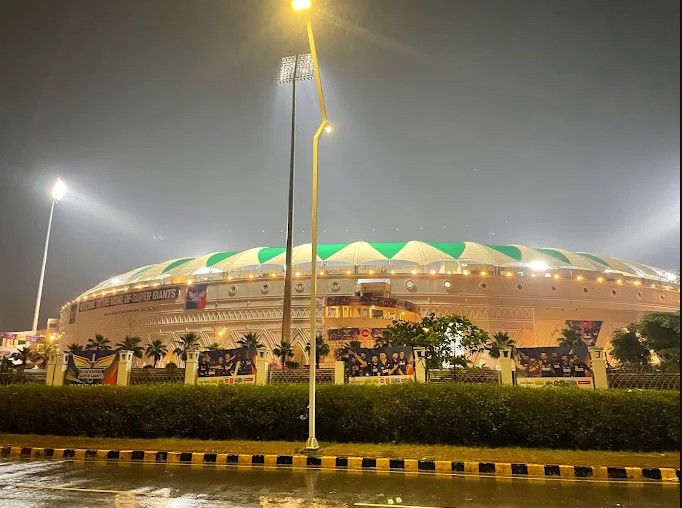Ekana Cricket Stadium, located in Lucknow, India, is one of the premier international cricket venues in the country. Since its inauguration in 2017, it has hosted numerous high-profile matches, including international Tests, ODIs, and T20s. One aspect that significantly influences the game played at any cricket ground is the boundary length—the distance from the center of the pitch to the edge of the playing field. This article delves into the detailed measurements of Ekana Stadium’s boundaries and how they impact gameplay, along with tables presenting precise dimensions.
Table of Contents
Why Boundary Lengths Matter
Boundary lengths in cricket define the size of the playing area and directly affect the game’s dynamics. Longer boundaries make it harder to score boundaries (fours and sixes), rewarding batsmen who can clear large distances, while shorter boundaries encourage aggressive batting. Bowlers and captains also strategize based on boundary sizes to contain batsmen effectively.
International cricket stadiums have standard guidelines from the International Cricket Council (ICC) about boundary sizes. According to ICC regulations, the distance from the center of the pitch to the boundary must be between 65 yards (59.43 meters) and 90 yards (82.29 meters).
Ekana Stadium Boundary Dimensions
Ekana Stadium was designed to meet ICC standards, with boundary lengths suitable for high-level competitive cricket. The field is oval-shaped, with different measurements for straight boundaries and square boundaries.
Summary of Ekana Stadium Boundary Lengths
| Boundary Position | Distance from Center of Pitch (Meters) | Distance from Center of Pitch (Yards) |
|---|---|---|
| Straight Boundary (Both Ends) | 70 meters | 76.55 yards |
| Square Leg Boundary (Mid-Wicket Side) | 68 meters | 74.35 yards |
| Point Boundary (Off Side) | 67 meters | 73.23 yards |
| Deep Midwicket Boundary | 69 meters | 75.47 yards |
| Deep Extra Cover Boundary | 69 meters | 75.47 yards |
Explanation of Boundary Positions
- Straight Boundary: The straight line down the pitch either towards the bowler’s end or the batsman’s end.
- Square Leg Boundary: On the leg side, perpendicular to the pitch.
- Point Boundary: On the off side, roughly at a 90-degree angle to the pitch.
- Deep Midwicket: Between square leg and straight boundary on the leg side.
- Deep Extra Cover: Between point and straight boundary on the off side.
Impact on Gameplay
At approximately 70 meters straight, Ekana Stadium has slightly longer boundaries than some smaller grounds but is fairly average for international cricket venues. This balance allows for a good mix of aggressive stroke play and tactical bowling.
- For Batsmen: The 67 to 70-meter boundary range encourages power hitters to clear the ropes but requires precise timing and strength. It is not as short as some stadiums known for small boundaries, so clearing sixes requires skill.
- For Bowlers: The boundary size allows bowlers to set defensive fields to protect boundaries while still encouraging attacking field placements. Spinners, fast bowlers, and medium pacers can vary lengths and lines to exploit the ground’s dimensions.
Comparison With Other Stadiums in India
To understand Ekana Stadium’s boundaries better, here’s a comparison with some famous Indian cricket grounds.
| Stadium | Straight Boundary (Meters) | Square Boundary (Meters) | Oval Shape (Y/N) |
|---|---|---|---|
| Ekana Stadium | 70 | 67-69 | Yes |
| Wankhede Stadium | 65 | 63-65 | No |
| M. Chinnaswamy | 68 | 66 | Yes |
| Eden Gardens | 67 | 68 | Yes |
| Narendra Modi Stadium | 70 | 69 | Yes |
Boundary Measurements and Pitch Conditions
While boundary lengths are fixed, pitch conditions can vary in Ekana Stadium due to Lucknow’s climate and ground maintenance. The stadium features a high-quality turf wicket, favoring batsmen on good days and spinners on others. The boundary distances combined with pitch behavior create a venue where all-rounders thrive—players who can bat aggressively and bowl with variety.
Future of Boundary Lengths at Ekana Stadium
There have been discussions about adjusting boundaries for specific tournaments or matches to suit formats like T20, which demand more aggressive scoring and shorter boundaries. However, as of now, the boundaries remain consistent, adhering to ICC standards.
Ekana Stadium’s boundary lengths, averaging around 67-70 meters, make it an ideal ground for international cricket—balancing challenge and excitement. Players must combine skill, power, and strategy to succeed here, with boundary size playing a key role in game plans. Understanding these measurements provides fans and analysts a deeper insight into how matches unfold at this iconic stadium.


